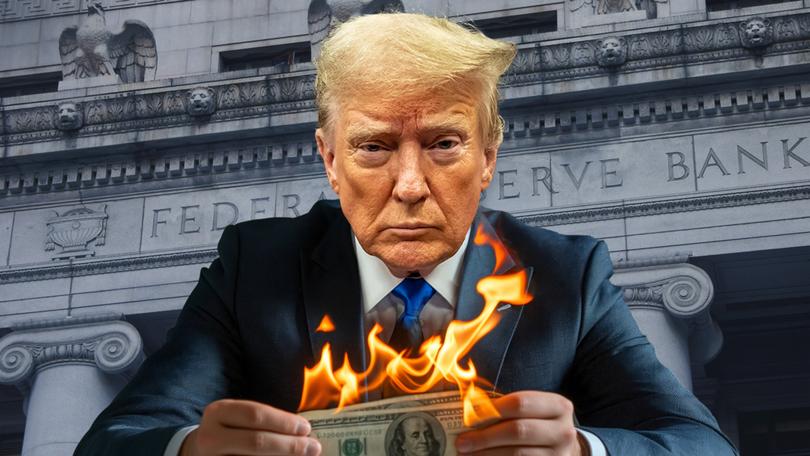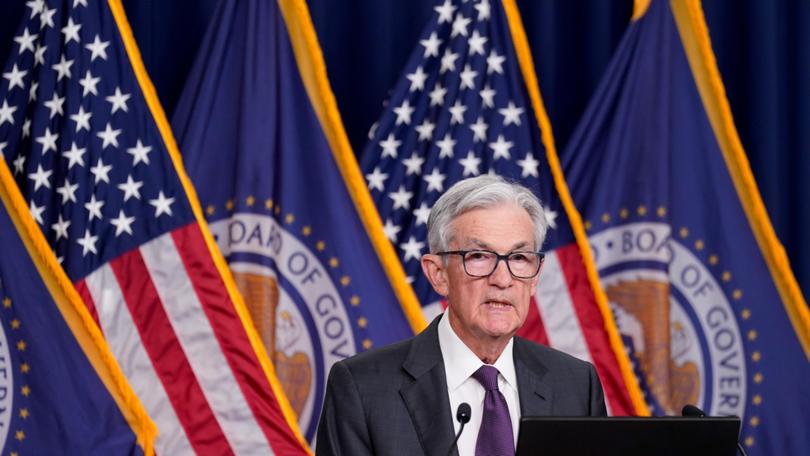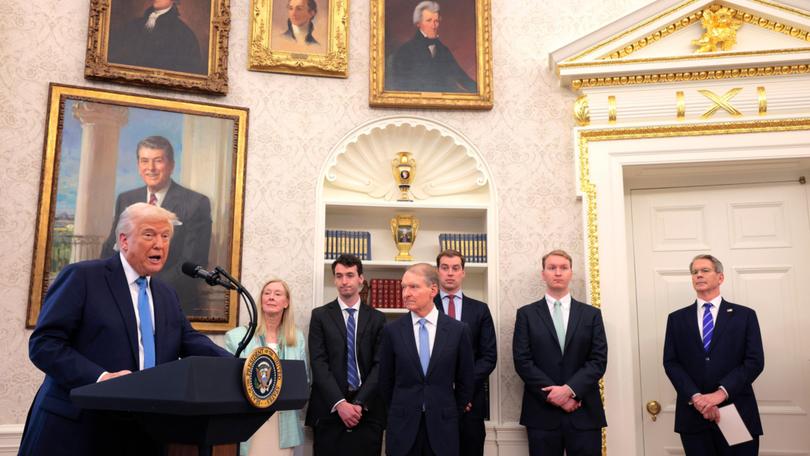THE ECONOMIST: Will fed up Donald Trump say ‘you’re fired’? US president takes aim at central bank ‘enemy’
Indications the White House is studying whether it could fire Jerome Powell are more reason to worry about the American economy.

US President Donald Trump can rarely resist the urge to engage in name-calling.
Typically, his barbs are more juvenile than consequential. But his designation of Jerome Powell, chair of the Federal Reserve, as “Mr Too Late, a major loser” is no mere insult.
It might be the harbinger of an assault on the central bank, and it is one more reason to worry about the American economy.
Sign up to The Nightly's newsletters.
Get the first look at the digital newspaper, curated daily stories and breaking headlines delivered to your inbox.
By continuing you agree to our Terms and Privacy Policy.When markets opened on April 21, after a long Easter weekend, American stocks, Treasury bonds and the dollar all sharply declined — another example of the “sell America” trade.
Even a few months ago such a reaction would have seemed overblown. Throughout Mr Trump’s first term he attacked the Fed in general and Mr Powell in particular.
Nothing came of it. The institutional and legal frameworks that have safeguarded the central bank’s independence for many decades are formidable. Moreover, the assumption went, if Mr Trump were truly to take a run at the Fed, blowback from markets would keep him in check.
Such confidence now seems complacent: Mr Trump’s second term is no facsimile of his first. The president is more aggressive, less restrained by those around him, less heedful of markets and more willing to follow his impulses, wherever they lead.
The latest salvo against the Fed began last week, after Mr Powell spoke of the challenge the bank faces from tariffs, which are expected to drive up prices while dragging down employment.
The comments led to a sharp stockmarket fall, and a tirade from Mr Trump. On April 17 he wrote that the Fed ought to be cutting rates and threatened Mr Powell, saying that his “termination cannot come fast enough”.
Lest there be any doubt about Mr Trump’s meaning, he told reporters that if he wanted Mr Powell gone, “he’ll be out of there real fast, believe me.”
Kevin Hassett, head of the National Economic Council and a figure seen as a moderating influence, added weight to Mr Trump’s words, indicating that the White House was studying whether it could fire Mr Powell.
Then, over the weekend, Mr Trump’s anger grew. On April 21 he fired off a social-media post in which he gave Mr Powell the “Mr Too Late” moniker and accused him of cutting rates last year in a failed attempt to help Kamala Harris win the presidential election.
Can Mr Trump actually fire Mr Powell?
Law, as currently understood, gives the central bank protection. The president can only remove the Fed chair “for cause” such as malfeasance — a standard that dates back to a Supreme Court ruling in 1935. Disagreeing about interest-rate decisions is not grounds for dismissal.

But the Supreme Court could soon weaken this pillar of Fed independence. After Mr Trump returned to the White House, he fired officials on two labour boards.
Both filed lawsuits, and the case has now reached the court. The Trump administration argues the “for cause” standard is an unjustified constraint on executive power, since it saddles the White House with agency heads who object to its policies. If the administration prevails, the outcome will be unsettling.
Mr Trump might conclude that he has the power to fire Mr Powell at will. And if that were allowed, he could then dismiss any other Fed governors, who previously had the security of a 14-year term, which is supposed to guarantee their independence.
Mercifully, such a scenario is probably far-fetched. Aware of the risk to markets, the Trump administration’s lawyers have tried to create distance between their arguments and the implications for the Fed.
In a brief this month, they said that the bank’s protections “are a distinct question with a unique historical pedigree”. The Supreme Court could concur that Mr Trump has the right to fire agency heads as he pleases, but nevertheless grant the Fed a carve-out.
Another possibility is a restructuring of the bank that would bring its regulatory powers more firmly under executive control while continuing to insulate its monetary-policy functions.

Mr Trump has other ways of trying to clip Mr Powell’s wings.
Before last November’s election, Scott Bessent, who is now treasury secretary, floated the possibility of a shadow Fed chair.
The idea was that investors would listen to the shadow as a crucial voice on monetary policy, knowing he or she would be in position to take the central bank’s helm after Mr Powell.
Given that Mr Powell’s term ends in little more than a year, Mr Trump need not go through the palaver of creating a shadow position. He could give a strong indication about whom he is likely to nominate, and market attention would shift.
Mr Trump is also playing a longer game.
The current Fed chair has an impressively thick skin and tries to lower the temperature. During Mr Trump’s first term Mr Powell steered clear of controversial comments even when the president labelled him an “enemy”. But whoever replaces Mr Powell next year may be meeker. They may conclude that it is easier to cut rates than endure Mr Trump’s barbs. Or they may simply share his views.
It is tempting to take solace in the fact that any attempt by Mr Trump to undermine the Fed would be self-defeating, as the past week has shown. Mr Trump’s attacks on Mr Powell spooked investors.
They sold off bonds and drove up yields — the exact opposite of the president’s desires. Members of his administration understand this dynamic. They have been briefing reporters that the president gets it, too, and that he does not want to roil financial markets. Sadly, though, such reassurance rings hollow these days.
Originally published as Trump fires at the Fed. America’s economy is collateral damage
